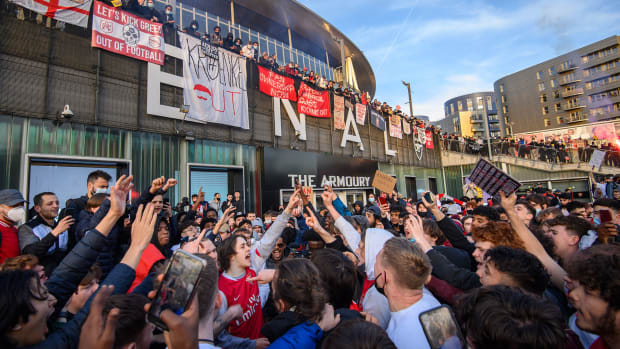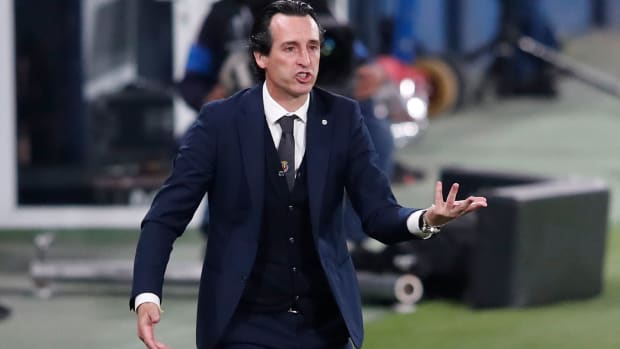Fans have had enough, a billionaire savior claims to have emerged and a former coach stands in the way of the one achievement that could salvage the season.
The good news for Arsenal is that it only lost 2-1 in the first leg of its Europa League semifinal against Villarreal. It was a game of extraordinary shifts. In the end, Arsenal may have been a little disappointed, but a one-goal defeat represented a significant comeback and evidence of character and fighting spirit from a team that has often lacked those qualities of late.
But nothing at Arsenal is straightforward these days. It has been a hectic couple of weeks. First there was the Super League fiasco, news of which broke as Arsenal scrambled to a highly unconvincing 1-1 draw at home to Fulham with a 97th-minute equalizer. It was just as well that Tottenham was also part of the 12 teams signed up to the breakaway or Arsenal, 10th in the Premier League and with a grand total of one Champions League or European Cup final to its name (and that was 15 years ago), would have looked truly ridiculous.
The Super League plan focused dissent and led to mass protests outside the Emirates against the Kroenke family's ownership. That in turn prompted the founder of Spotify, Swedish billionaire Daniel Ek, to suggest on Twitter that—and then again in subsequent TV spots—having been an Arsenal fan since the age of eight, he would be keen to buy the club. Thierry Henry, Dennis Bergkamp and Patrick Vieira all apparently support his bid, although skepticism remains as to how serious he really is.

The Kroenkes have released a statement saying they have no intention of selling, but Ek seemed undaunted, saying he had put a package together and was prepared for a long battle. Reports have suggested an initial bid of £1.8 billion. If true, that might be enough to persuade the Kroenkes to reconsider. Football clubs simply don’t go for that sort of money. When the Glazers bought Manchester United in 2005 it was for £790 million, but they were buying a club that had been consistently successful for 15 years.
Arsenal has its history, of course, and brand recognition around the world, but its most valuable asset is probably a stadium in an expensive part of North London. Still, it’s hard not to think that a billionaire looking for an investment would not be better picking up a smaller club and investing heavily in players. Newcastle United, for instance, would cost around £350 million. This is an Arsenal squad that requires a huge amount of work even to be a regular qualifier for the Champions League again.
If Ek is a fan, perhaps such considerations are not a concern, but amid the economic uncertainty that the pandemic has brought, and with TV revenues having plateaued, the football boom that, in England at least, has continued almost unchecked for 30 years, suddenly looks insecure. In such an environment, £1.8 billion for a mid-table side with an average squad may start to become tempting. If the offer is real, that is.
Yet as disappointing as this season has been, it could be salvaged by Europa League success, which would bring with it a place in next season’s Champions League. But there is no greater specialist in the Europa League than Unai Emery, who took Arsenal to the final two years ago but was run out of London after being named Arsène Wenger's successor.

His Villarreal is well-organized, defends well and is lethal on the break. But at the same time, Arsenal contributed to its downfall in Thursday's semifinal first leg. Four minutes in, Granit Xhaka was left isolated against Samuel Chukwueze after Juan Foyth was allowed to surge into space after four minutes. Although he eventually lost control, Manu Trigueros lashed in the loose ball. Just before the half-hour mark, the veteran defender Raul Albiol added a second, slamming in from close range after Gerard Moreno had flicked on a Dani Parejo corner.
Arsenal had had most of the ball and had looked vaguely threatening at times, but seemingly had little idea how to keep Villarreal out. It’s not a technical failing as much as a lack of game awareness, a chronic naivete that is only partly explained by the youth of so many of the forwards.
What hopes Arsenal had of a comeback seemed to have disappeared 11 minutes into the second half as Dani Ceballos, with a certain inevitability, collected a second yellow card and was sent off. The temptation might have been to sit back and look to limit the damage, but to Arsenal’s credit it continued to threaten, and a 73rd-minute Nicolas Pépé penalty, awarded when Bukayo Saka was tripped by Trigueros, offered a lifeline.
Four minutes later, Étienne Capoue picked up his second yellow and it was 10-v-10 for the remainder of the match. Arsenal couldn’t find an equalizer, but it goes into the second leg just one goal behind and within an away goal which, after an hour, seemed like an implausibly optimistic outcome. The Europa League may yet redeem the season.
More Soccer Coverage: